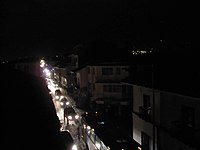
Photo from wikipedia
Uncertain events such as renewable generation and load fluctuation will introduce uncertainties into the grid that might severely affect the system's robustness against cascading failure. A stochastic model for studying… Click to show full abstract
Uncertain events such as renewable generation and load fluctuation will introduce uncertainties into the grid that might severely affect the system's robustness against cascading failure. A stochastic model for studying the cascading failure dynamics of cyber-physical power systems is proposed, the aim being to examine the impacts of uncertainties on the system's vulnerability to cascading failure. This model retains the structural and operating characteristics of cyber-physical power systems. Topological failure and communication operational failure described by data traffic model are considered as being deterministic, whereas grid operational failure described by probabilistic load flow model is considered as being stochastic. Stochastic methods are used to select the failure-prone components and to determine the time of failure of each selected component. Moreover, the effects of load uncertainty and heavy load demands on the system's vulnerability to cascading failure are studied. Simulation results indicate that the failure propagation of a cyber-physical power system is the result of repeated mutual triggering between the power network and the coupled communication network. In addition, the increased load uncertainty can cause cascading failure, and the higher the load uncertainty the more severe the blackouts. Moreover, higher load demand makes the coupled system more vulnerable to cascading failure.
Journal Title: IEEE Systems Journal
Year Published: 2020
Link to full text (if available)
Share on Social Media: Sign Up to like & get
recommendations!